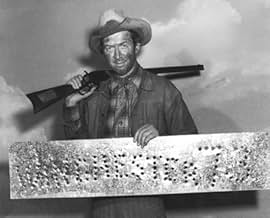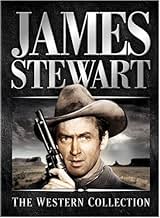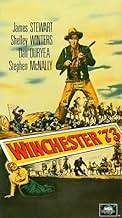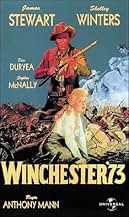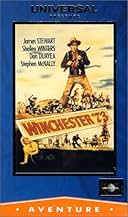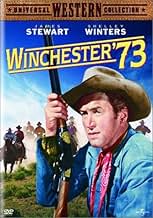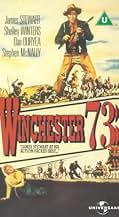IMDb-BEWERTUNG
7,6/10
23.430
IHRE BEWERTUNG
Die Reise eines wertvollen Gewehrs von einem unglücklichen Besitzer zum nächsten entspricht der Suche eines Cowboys nach einem geflohenen Mörder.Die Reise eines wertvollen Gewehrs von einem unglücklichen Besitzer zum nächsten entspricht der Suche eines Cowboys nach einem geflohenen Mörder.Die Reise eines wertvollen Gewehrs von einem unglücklichen Besitzer zum nächsten entspricht der Suche eines Cowboys nach einem geflohenen Mörder.
- Regie
- Drehbuch
- Hauptbesetzung
- Auszeichnungen
- 1 Gewinn & 1 Nominierung insgesamt
Tony Curtis
- Doan
- (as Anthony Curtis)
Victor Adamson
- Townsman
- (Nicht genannt)
Robert Anderson
- Basset
- (Nicht genannt)
Empfohlene Bewertungen
The picture is developed in 1873 and talks about Lin McAdam (James Stewart , extremely anxious to show up in more challenging characters) and High Spade (Millard Michell) arrive in Dodge City looking for an enemy called Dutch Henry (Stephen McNally) . The sheriff Wyatt Hearp (Will Geer , though initially felt he was badly miscast ) obligates them to leave their guns . Both of them participate in a shot-contest and Stewart shot (actually shot by renowned marksman Herb Parsons) a bullet through the washer with the postage stamp, then he earns a Winchester 73 , the greatest rifle in the west , but it is robbed and starting the possession through hand to hand (John McIntire , Charles Drake , Dan Duryea) . Meanwhile , the starring going on a merciless vengeance.
First western interpreted by James Stewart , subsequently following a lot , most of them directed by Anthony Mann ; formerly , in the early 1930s Stewart had worked with Mann in the theater . At the time of shooting , James was very worried that the general perception was of him as a limited actor, then he found filmmaker Anthony Mann very helpful in breaking that perception. Both , Stewart and Mann achieved to revive the genre during the decade 50s . James Stewart inaugurated a new type of wage, the percentage on the box office that will imitate posteriorly others great Hollywood stars . The film has an extraordinary casting , including brief apparition by Rock Hudson and Tony Curtis , both of whom newcomers . Of course, all the western's essential elements are in this film, such as : Shootouts , Red Indian attack , violent raids by outlaws , final showdown , among others .
The breathtaking cinematography in black and white is made by Greta Garbo's favourite photographer : Willian Daniels . Although the script results to be an adaptation based on ¨Big gun¨ , a novel written by Stuart L. Lake and screenwriter by prestigious Borden Chase, being also based about real events because 4 July 1876 in Dodge City had a shot competition and the winner was rewarded with a Winchester 73 model 1873 with ability shoot 17 cartridges caliber 44/40 in a few seconds .The picture was well narrated and directed by the magnificent director Anthony Mann , though Fritz Lang was originally slated to direct this movie , when he backed out, James Stewart recommended Anthony Mann . Anthony made abundant classic western , such as : ¨Bend the river¨ , ¨Far country¨ , ¨Man of Laramie¨ , ¨Naked spur¨, ¨Tin star¨ and several others . Better than average . Rating : 8/10. Well worth watching .
First western interpreted by James Stewart , subsequently following a lot , most of them directed by Anthony Mann ; formerly , in the early 1930s Stewart had worked with Mann in the theater . At the time of shooting , James was very worried that the general perception was of him as a limited actor, then he found filmmaker Anthony Mann very helpful in breaking that perception. Both , Stewart and Mann achieved to revive the genre during the decade 50s . James Stewart inaugurated a new type of wage, the percentage on the box office that will imitate posteriorly others great Hollywood stars . The film has an extraordinary casting , including brief apparition by Rock Hudson and Tony Curtis , both of whom newcomers . Of course, all the western's essential elements are in this film, such as : Shootouts , Red Indian attack , violent raids by outlaws , final showdown , among others .
The breathtaking cinematography in black and white is made by Greta Garbo's favourite photographer : Willian Daniels . Although the script results to be an adaptation based on ¨Big gun¨ , a novel written by Stuart L. Lake and screenwriter by prestigious Borden Chase, being also based about real events because 4 July 1876 in Dodge City had a shot competition and the winner was rewarded with a Winchester 73 model 1873 with ability shoot 17 cartridges caliber 44/40 in a few seconds .The picture was well narrated and directed by the magnificent director Anthony Mann , though Fritz Lang was originally slated to direct this movie , when he backed out, James Stewart recommended Anthony Mann . Anthony made abundant classic western , such as : ¨Bend the river¨ , ¨Far country¨ , ¨Man of Laramie¨ , ¨Naked spur¨, ¨Tin star¨ and several others . Better than average . Rating : 8/10. Well worth watching .
For the viewer who comes upon it long after its making, "Winchester '73" has something in common with "Casablanca." While you watch it, you get this feeling that you're looking at a string of clichés encountered so often in the genre; then you realise that the clichés became clichés only after being copied from this particular film, and that they were so widely copied because this film was so great. In other words, it's a seminal work.
"Winchester '73" is a joy to watch. The broad lines of the plot are somewhat predictable, but mostly because you've seen them copied so many times in later movies, and nevertheless it still contains a number of twists which surprise you. The dialogue, the pacing and Mann's direction are excellent. Stewart shines in particular, and if you're a fan this is a "must-see," but he is not alone in delivering a good performance. Remarkably, many of the most thoughtful and/or witty lines go to minor characters. Because this makes these characters (much) more than cardboard cutouts, it lent additional realism to the film.
This is a remarkably underrated film, and well worth keeping an eye out for. The DVD also contains an interview with Stewart which provides some background on the film.
"Winchester '73" is a joy to watch. The broad lines of the plot are somewhat predictable, but mostly because you've seen them copied so many times in later movies, and nevertheless it still contains a number of twists which surprise you. The dialogue, the pacing and Mann's direction are excellent. Stewart shines in particular, and if you're a fan this is a "must-see," but he is not alone in delivering a good performance. Remarkably, many of the most thoughtful and/or witty lines go to minor characters. Because this makes these characters (much) more than cardboard cutouts, it lent additional realism to the film.
This is a remarkably underrated film, and well worth keeping an eye out for. The DVD also contains an interview with Stewart which provides some background on the film.
My favorite movie genre is the western, it's really the only movie genre that is of American origin. And despite Sergio Leone, no one does them quite like Americans.
Right at the top of my list of ten favorites westerns is Winchester 73. It was the first pairing and only black and white film of the partnership of director Anthony Mann and actor James Stewart. It was also a landmark film in which Stewart opted for a percentage of the profits instead of a straight salary from Universal. Many such deals followed for players, making them as rich as the moguls who employed them.
Anthony Mann up to this point had done mostly B pictures, noir type stuff with no real budgets. Just before Winchester 73 Mann had done a fine western with Robert Taylor, Devil's Doorway, that never gets enough praise. I'm sure James Stewart must have seen it and decided Mann was the person he decided to partner with.
In this film Mann also developed a mini stock company the way John Ford was legendary for. Besides Stewart others in the cast like Millard Mitchell, Steve Brodie, Dan Duryea, John McIntire, Jay C. Flippen and Rock Hudson would appear in future Mann films.
It's a simple plot, James Stewart is obsessed with finding a man named Dutch Henry Brown and killing him. Why I won't say, but up to this point we had never seen such cold fury out of James Stewart on screen. Anthony Mann reached into Jimmy Stewart's soul and dragged out some demons all of us are afraid we have.
The hate is aptly demonstrated in a great moment towards the beginning of the film. After Stewart and sidekick Millard Mitchell are disarmed by Wyatt Earp played by Will Geer because guns aren't carried in Earp's Dodge City. There's a shooting contest for a Winchester rifle in Dodge City and the betting favorite is Dutch Henry Brown, played with menace by Stephen McNally. Stewart, Mitchell and Geer go into the saloon and Stewart and McNally spot each other at the same instant and reach to draw for weapons that aren't there. Look at the closeups of Stewart and McNally, they say more than 10 pages of dialog.
Another character Stewart runs into in the film is Waco Johnny Dean played by Dan Duryea who almost steals the film. This may have been Duryea's finest moment on screen. He's a psychopathic outlaw killer who's deadly as a left handed draw even though he sports two six guns.
Another person Stewart meets is Shelley Winters who's fiancé is goaded into a showdown by Duryea and killed. Her best scenes are with Duryea who's taken a fancy to her. She plays for time until she can safely get away from him. Guess who she ultimately winds up with?
There are some wonderful performances in some small roles, there ain't a sour note in the cast. John McIntire as a shifty Indian trader, Jay C. Flippen as the grizzled army sergeant and Rock Hudson got his first real notice as a young Indian chief. Even John Alexander, best known as 'Theodore Roosevelt' in Arsenic and Old Lace has a brief, but impressive role as the owner of a trading post where both McNally and Stewart stop at different times.
Mann and Stewart did eight films together, five of them westerns, and were ready to do a sixth western, Night Passage when they quarreled and Mann walked off the set. The end of a beautiful partnership that produced some quality films.
Right at the top of my list of ten favorites westerns is Winchester 73. It was the first pairing and only black and white film of the partnership of director Anthony Mann and actor James Stewart. It was also a landmark film in which Stewart opted for a percentage of the profits instead of a straight salary from Universal. Many such deals followed for players, making them as rich as the moguls who employed them.
Anthony Mann up to this point had done mostly B pictures, noir type stuff with no real budgets. Just before Winchester 73 Mann had done a fine western with Robert Taylor, Devil's Doorway, that never gets enough praise. I'm sure James Stewart must have seen it and decided Mann was the person he decided to partner with.
In this film Mann also developed a mini stock company the way John Ford was legendary for. Besides Stewart others in the cast like Millard Mitchell, Steve Brodie, Dan Duryea, John McIntire, Jay C. Flippen and Rock Hudson would appear in future Mann films.
It's a simple plot, James Stewart is obsessed with finding a man named Dutch Henry Brown and killing him. Why I won't say, but up to this point we had never seen such cold fury out of James Stewart on screen. Anthony Mann reached into Jimmy Stewart's soul and dragged out some demons all of us are afraid we have.
The hate is aptly demonstrated in a great moment towards the beginning of the film. After Stewart and sidekick Millard Mitchell are disarmed by Wyatt Earp played by Will Geer because guns aren't carried in Earp's Dodge City. There's a shooting contest for a Winchester rifle in Dodge City and the betting favorite is Dutch Henry Brown, played with menace by Stephen McNally. Stewart, Mitchell and Geer go into the saloon and Stewart and McNally spot each other at the same instant and reach to draw for weapons that aren't there. Look at the closeups of Stewart and McNally, they say more than 10 pages of dialog.
Another character Stewart runs into in the film is Waco Johnny Dean played by Dan Duryea who almost steals the film. This may have been Duryea's finest moment on screen. He's a psychopathic outlaw killer who's deadly as a left handed draw even though he sports two six guns.
Another person Stewart meets is Shelley Winters who's fiancé is goaded into a showdown by Duryea and killed. Her best scenes are with Duryea who's taken a fancy to her. She plays for time until she can safely get away from him. Guess who she ultimately winds up with?
There are some wonderful performances in some small roles, there ain't a sour note in the cast. John McIntire as a shifty Indian trader, Jay C. Flippen as the grizzled army sergeant and Rock Hudson got his first real notice as a young Indian chief. Even John Alexander, best known as 'Theodore Roosevelt' in Arsenic and Old Lace has a brief, but impressive role as the owner of a trading post where both McNally and Stewart stop at different times.
Mann and Stewart did eight films together, five of them westerns, and were ready to do a sixth western, Night Passage when they quarreled and Mann walked off the set. The end of a beautiful partnership that produced some quality films.
The traditional Western is synonymous with wide open spaces, clearcut morality, inevitable storylines, the optimistic faith in a hero's ability to shape his own destiny, to escape his past. These qualities reflect directly the American sense of self, the self-shaping Dream, the pushing of boundaries and frontiers, which is why the genre is still alluded to by opportunistic politicians. With some noble exceptions (eg Wellman, Hawks), the Western was healthily free of neuroses or real anxiety. Anthony Mann changed all that forever, and this first foray into the genre is one of the most violent, vivid, complex, not to say exciting Westerns ever made.
The traditional Western depends on a hero who exemplifies rugged wholesomeness, whatever misfortunes he may have had in the past, a supporter of order and right, who dominates the film, removes its obstacles, restores harmony in effect; and an obvious villain, who often, ironically, drives the plot, forces the hero into certain actions. The difference between the two is often delineated as mythically simple as the wearing of white or black hats.
Mann's background was in film noir, a genre antithetical to wide open spaces and optimism. Noir was neurotically charged, focusing on the dissolution of an unstable protagonist, where morality is blurred, the hero is as often the villain, trapped in an interior-labyrinth of his own making, a passive victim to destiny. Noir is about regress not progress, the interrogating and denying of modes and signs of representation, not the creation and confirmation of them.
WINCHESTER 73 is fraught with noir anxiety. Noir is often considered a psychological genre, visualising the traumas of its protagonist's head. 73 does this too, and is all the more disturbing in that that protagonist is lovely, homespun Jimmy Stewart, initiating here his great run of difficult films with Mann and Hitchcock. In many ways, good-natured and sweet, representing right and trying to restore disruptions to the natural order, he is also a near-lunatic who will stop at nothing to achieve murderous revenge, whose relentless quest mirrors Ethan Edwards in THE SEARCHERS in its inhuman persistance, whose human instincts are frayed by this quest, and whose bursts of violence are genuinely terrifying to witness.
As in noir, his anxiety has a psychological base - unlike most 'healthy' heroes who have outgrown (symbolically killed) their fathers, McAdam's father was killed before he could complete the process; his chasing his brother is less moral revenge than an anguished protest against stunted growth. The climactic shoot-out is not cathartic: McAdam staggers back into 'normal' society, like he's just witnessed some of the world's most ghastly horrors.
What is most unsettling about the film is that it's not really about a hero or a villain at all, but an inanimate piece of weoponry that drives the action. 73 opens with the gun of the title privileged, on display behind a glass window, while its admirers are trapped, squashed, undifferentiated, framed, admiring it outside. Throughout the film, human power is reduced to the most arbitrary of signifiers - names change; Lin and Dutch mime shooting each other because they've no guns; quests lose their moral vitality and their practitioners veer close to madness; armies have to ask for help from Confederate strangers to fight battles; a man becomes worthy of respect only when he mentions his name; another man is revealed as a coward when he abandons his fiancee to the Indians; the gun retains its prestige, power, wholeness.
It's not the revenge plot which drives the film, but the story of the gun; this wrenches the film out of conventional expectations, and creates an eerie, alienating, modern feel. We become so caught up in the revenge plot that when we follow, with the gun, another plot entirely, we feel slightly bewildered.
This emphasis on the gun, symbol of potent masculinity, actually allows for a critique of that masculinity, revealing pointless elaborate rituals at the expense of society and order; brute capitalist greed; murderous Indian-traders who defraud both seller and enemy; cowards; psychotic killers; before returning to its 'true' owner, a broken hero thoroughly compromised, who has become as murderous as the murderer he seeks. The gun is never imprinted with the name of its owner, not only because there is no fixed owner, but because there is no fixed masculinity, an insight anathema to the traditional Western.
73 brilliantly invokes Western myths - Wyatt Earp, Dodge City, the Cavalry, the Civil War, the wide open West - only to undermine them. Earp has an inflated reputation that is all name but never proven - Dodge City is no safer against outlaws than anywhere else; the Cavalry is inept (Custer has just lost Little Big Horn) and the bitter feud of the War is shown to be irrelevant. The myth of the open West is a site for a very closed, inescapable, circular plot which traps its characters, refuses to allow them shape their destiny, but allowing it to shape them.
The old John Ford silhouette of riders on a vast mountain is reprised, but signals here not progress but repetition and circularity. But for all its deconstruction, the film is also tangibly vivid in a way few Westerns ever achieve. Mann's incisive technique intrudes his camera in crucial positions, alternating revealing distance with intense examination, making the saloon doors and stagecoaches seem thrillingly alive and lived in.
The traditional Western depends on a hero who exemplifies rugged wholesomeness, whatever misfortunes he may have had in the past, a supporter of order and right, who dominates the film, removes its obstacles, restores harmony in effect; and an obvious villain, who often, ironically, drives the plot, forces the hero into certain actions. The difference between the two is often delineated as mythically simple as the wearing of white or black hats.
Mann's background was in film noir, a genre antithetical to wide open spaces and optimism. Noir was neurotically charged, focusing on the dissolution of an unstable protagonist, where morality is blurred, the hero is as often the villain, trapped in an interior-labyrinth of his own making, a passive victim to destiny. Noir is about regress not progress, the interrogating and denying of modes and signs of representation, not the creation and confirmation of them.
WINCHESTER 73 is fraught with noir anxiety. Noir is often considered a psychological genre, visualising the traumas of its protagonist's head. 73 does this too, and is all the more disturbing in that that protagonist is lovely, homespun Jimmy Stewart, initiating here his great run of difficult films with Mann and Hitchcock. In many ways, good-natured and sweet, representing right and trying to restore disruptions to the natural order, he is also a near-lunatic who will stop at nothing to achieve murderous revenge, whose relentless quest mirrors Ethan Edwards in THE SEARCHERS in its inhuman persistance, whose human instincts are frayed by this quest, and whose bursts of violence are genuinely terrifying to witness.
As in noir, his anxiety has a psychological base - unlike most 'healthy' heroes who have outgrown (symbolically killed) their fathers, McAdam's father was killed before he could complete the process; his chasing his brother is less moral revenge than an anguished protest against stunted growth. The climactic shoot-out is not cathartic: McAdam staggers back into 'normal' society, like he's just witnessed some of the world's most ghastly horrors.
What is most unsettling about the film is that it's not really about a hero or a villain at all, but an inanimate piece of weoponry that drives the action. 73 opens with the gun of the title privileged, on display behind a glass window, while its admirers are trapped, squashed, undifferentiated, framed, admiring it outside. Throughout the film, human power is reduced to the most arbitrary of signifiers - names change; Lin and Dutch mime shooting each other because they've no guns; quests lose their moral vitality and their practitioners veer close to madness; armies have to ask for help from Confederate strangers to fight battles; a man becomes worthy of respect only when he mentions his name; another man is revealed as a coward when he abandons his fiancee to the Indians; the gun retains its prestige, power, wholeness.
It's not the revenge plot which drives the film, but the story of the gun; this wrenches the film out of conventional expectations, and creates an eerie, alienating, modern feel. We become so caught up in the revenge plot that when we follow, with the gun, another plot entirely, we feel slightly bewildered.
This emphasis on the gun, symbol of potent masculinity, actually allows for a critique of that masculinity, revealing pointless elaborate rituals at the expense of society and order; brute capitalist greed; murderous Indian-traders who defraud both seller and enemy; cowards; psychotic killers; before returning to its 'true' owner, a broken hero thoroughly compromised, who has become as murderous as the murderer he seeks. The gun is never imprinted with the name of its owner, not only because there is no fixed owner, but because there is no fixed masculinity, an insight anathema to the traditional Western.
73 brilliantly invokes Western myths - Wyatt Earp, Dodge City, the Cavalry, the Civil War, the wide open West - only to undermine them. Earp has an inflated reputation that is all name but never proven - Dodge City is no safer against outlaws than anywhere else; the Cavalry is inept (Custer has just lost Little Big Horn) and the bitter feud of the War is shown to be irrelevant. The myth of the open West is a site for a very closed, inescapable, circular plot which traps its characters, refuses to allow them shape their destiny, but allowing it to shape them.
The old John Ford silhouette of riders on a vast mountain is reprised, but signals here not progress but repetition and circularity. But for all its deconstruction, the film is also tangibly vivid in a way few Westerns ever achieve. Mann's incisive technique intrudes his camera in crucial positions, alternating revealing distance with intense examination, making the saloon doors and stagecoaches seem thrillingly alive and lived in.
Buffs of the adult western that flourished in the 1950s try and trace its origins to the film that kicked off the syndrome. Of course, we can go back to Howard Hawks's Red River (1948) or further still to John Ford's My Darling Clementine (1946), but if we want to stick with this single decade, then it has to be one of a couple of films made in that era's initial year. One is "The Gunfighter," an exquisitely grim tale of a famed gunslinger (Ringo) facing his last shootout. Another from that same year is "Winchester '73," and it's worth noting that Millard Mitchell appears in both as grim, mustached, highly realistic range riders. In The Gunfighter, he's the town marshal expected to arrest Ringo but once rode with him in an outlaw gang. In Winchester, he's the sidekick to Jimmy Stewart, a kind of Horatio to Stewart's Hamlet in this epic/tragic tale. The plot is simple enough: Stewart's lonesome cowpoke wins a remarkable Winchester in a shooting match, beating the meanest man in the west (Stephen McNally), who is actually his own brother and caused the death of their father. When the brother steals the gun, Stewart and Mitchell go after him in a cowboy odyssey that takes them all across the frontier, meeting up with both outlaws and Indians. (In one wonderful bit, two future stars - Rock Hudson and Tony Curtis - play an Indian chief and a U.S. cavalry soldier - during a well staged pitched-battle. Dan Duryea steals the whole show as a giggling outlaw leader, while Shelly Winters, just before she began to gain weight, is fine as the shady lady who ties all the plots together. Today, filmmakers would go on for about four hours to bring such an ambitious idea to the screen, but Anthony Mann does so in an extremely economical amount of time, with not a minute wasted. Such western legends as Bat Masterson and Wyatt Earp (terrifically played by Will Geer) make brief appearances, adding to the historicity as well as the epic nature. The final battle between good and bad brothers, high atop a series of jutting rock canyons, is now legendary among western buffs. It's also worth noting that Stewart, however much associated he became with western films, does what is actually his first western leading man role here - yes, he was in Destry Rides Again eleven years earlier, but was cast in that comedy spoof because he seemed so WRONG for westerns!
Wusstest du schon
- WissenswertesJames Stewart credited this film with saving and redefining his career after a series of postwar flops threatened to seriously damage it.
- PatzerThis movie is based on a rifle-shooting competition held in Dodge City on 4 July 1876. During a poker game in the movie, Dutch refers to a "Dead Man's Hand". This refers to the poker hand 'Wild Bill' Hickok was holding when he was shot in the back by Jack McCall on 2 August 1876 - less than a month later. It was too soon for the "Dead Man's Hand" to be a famous phrase. However, per IMDb guidelines for Anachronisms, "a good deal of leeway" is allowed; linguistic anachronisms are usually excused (modern words in historical films) - "always bear in mind that it's entertainment not documentary."
- Zitate
Wyatt Earp: That's Dutch Henry Brown. I thought you said you didn't know him.
Lin McAdam: I said I didn't recall the name.
- Crazy CreditsThe film's opening prologue states: This is a story of the Winchester Rifle Model 1873 "The gun that won the West" To cowman, outlaw, peace officer or soldier, the Winchester '73 was a treasured possession. An Indian would sell his soul to own one . . .
- VerbindungenFeatured in MacArthur - Held des Pazifik (1977)
Top-Auswahl
Melde dich zum Bewerten an und greife auf die Watchlist für personalisierte Empfehlungen zu.
- How long is Winchester '73?Powered by Alexa
Details
- Erscheinungsdatum
- Herkunftsland
- Offizieller Standort
- Sprache
- Auch bekannt als
- Winchester '73
- Drehorte
- Produktionsfirma
- Weitere beteiligte Unternehmen bei IMDbPro anzeigen
Box Office
- Weltweiter Bruttoertrag
- 3.172 $
- Laufzeit1 Stunde 32 Minuten
- Farbe
- Seitenverhältnis
- 1.37 : 1
Zu dieser Seite beitragen
Bearbeitung vorschlagen oder fehlenden Inhalt hinzufügen

